Today we are beginning a new series on original sin based on Kegan Chandler’s presentation from last year, entitled, “Origins of Sin: The New Heretics and the Metaphysics of Disobedience.” I’m excited about this four part series for a couple of reasons. First off, I’m glad to host a place where we can discuss genuine theological differences in a respectful and constructive way. So often in Christianity today, there’s just not an opportunity for peer review. Well, here on Restitutio, we are going to do just that. Secondly, I’m excited because this is an important topic that many of us have not through. Oftentimes until someone challenges our beliefs, we just go with the flow. However, whether we realize it or not, that flow was determined long ago by Christians whose reasoning may or may not stand up to scrutiny today.
In what follows Chandler is going to present his case that the idea of original sin goes back to Augustine who combined bits and pieces from earlier Christians like Cyprian and the Manicheans. Now, this is a strong position Chandler takes. Essentially, he argues that the doctrine of original sin is not native to scripture, an innovation of the fifth century. If Chandler is right then all of us are born neutral without the stain of Adam’s sin upon us. Furthermore, Christians need to stop making excuses for sinning and realize that we can live without sin.
Next week, I’ll air part two, which will be Jerry Wierwille’s critique of this presentation. Then I have two more interviews where Chandler and Wierwille discuss this topic at length.
Also, I took notes on Chandler’s presentation which may help you navigate your way through this talk as well as show you the spelling for these ancient Christians in case you want to research any of them further. (See below.)
—— Links ——
- You can watch the raw video of this talk on YouTube (including the Q&A, starting at 1:18:00)
- Other Restitutio podcasts with Kegan Chandler
- Check out his books The God of Jesus in Light of Christian Dogma and Constantine and the Divine Mind
- Follow Chandler on his Buried Deep blog and his God of Jesus website.
- Read his scholarly papers on Academia.edu
- If you’d like to support Restitutio financially, you can donate here.
- Intro music: Good Vibes by MBB Attribution-ShareAlike 3.0 Unported (CC BY-SA 3.0) Free Download / Stream: Music promoted by Audio Library
—— Notes ——
Augustine’s Doctrine Defined
- A) Adam’s disobedience caused transgressions to enter the world of humanity
- B) Adam’s disobedience caused all of his progeny to physically die
- C) Adam’s disobedience fundamentally changed human nature.
- D) Adam originally had free will, but it became corrupt as a consequence of his disobedience.
- E) Adam’s disobedience caused all of his progeny to be born without free will (a ‘non-free’ free will).
- F) Adam’s disobedience transmitted sin-guilt to all his progeny.
- G) Adam’s disobedience transmitted a sinning-nature to all his progeny, so that they sin by necessity.
- H) Adam’s disobedience caused his progeny to be born with concupiscence.
- I) Original sin is transmitted into human nature through the human reproduction process.
- J) Infants who do not receive baptism are condemned to hell.
- K) The current human condition is a just punishment for wrongdoing.
- L) All sinned “in Adam” (in his loins).
Eastern Christian Authors
Barnabas: personal responsibility; children born innocent
Justin Martyr: has power to do good or ill by free choice; curse of Adam is mortality
Encratites: opposed intercourse; thought babies were born with sin (Tatian falls into this category)
Melitio of Sardis: individual human agency; you are a free man
Theophilus of Antioch: God made man free with power unto himself
Athenagoras of Athens: vice and virtue in our own power
Irenaeus: (Augustine claimed him) but he denied inheritance of sin nature
Clement of Alexandria: to obey or not is in our own power; Augustine used Job 14.4; Psalm 51.5, but Clement said these were used by Encratites
Origen of Alexandria: pre-existent souls disobeyed and that’s what earned death, though he also inherited a terrible stain from Adam; born with propensity to sin; faculty of free will is never taken away.
Athanasius: don’t think evil is in man’s nature; they are responsible for sinning
Cyril of Jerusalem: people used Romans 7 incorrectly and says Romans 6 says we should stop sinning and we have the power to sin or not
John Chrysostom: infants are not defiled w/ sin; we first choose the good then God helps us
Western Christian Authors
Clement of Rome: people bring judgment upon themselves by their actions
Valentinus (Gnostic): Romans 7; our matter is linked to sin
Tertulian: stain inherited from Adam has nothing to do with infant baptism
Augustine said Cyprian, Ambrose, Jerome, Ambrosiaster taught him
Cyprian: when baptized infants had sins washed away that were not their own; Jaraslov Pelikan says Cyprian’s letter 64 contains the first explicit linkage between original guilt and the salvific effect of infant baptism; Cyprian did not believe in the bondage of the will like Augustine
Ambrose: believed in hereditary guilt and concupiscence; before sin in the garden, there was no sexual desire; sexual desire is a punishment for original rebellion; sex is deeply sinful as a result; no bondage of the will
Ambrosiaster: his commentary on Romans affected Augustine; his translation had Romans 5.12 as “So death spread to all men, because all sinned in him”; possible for man to gain favor with God and that obedience was requisite for salvation; inherited propensity to sin plus free will
Jerome: infants born corrupted; affirmed free will; we can choose God; God calls and man responds in faith
Where did Augustine get the idea of the bondage of the will?
Manichean Theory
Manicheans had a dualistic worldview; sex was sinful; procreation traps spirit in bodies; physical vs. spiritual
Augustine was a Manichean disciple for 10 years
before 412, Augustine believed in free will
After much debate with Manicheans, he gave up on free will and adopted Manichean idea of the bondage of the will
Augustine had plenty of differences with Manicheans. For example they denied the Fall
Chandler’s Theory about where Augustine got his doctrine of original sin: Augustine left Manicheism and their idea of the bondage of the will, but then after much debate with them, reverted back to that belief while remaining a Christian
Augustine did not invent original sin out of thin air, but he stitched together Manichean and Catholic ideas in a new way
Chandler’s Theory about why Augustine’s idea came to dominate Christianity: Augustine’s doctrine was more attractive and grew in popularity because it made the battle with sin easier since we cannot conquer it anyhow
Explaining Romans 5.12
Romans 4.15; 5.13; 7.8-9 w/o contentiousness of the law, people aren’t guilty (including babies and the mentally handicapped)
Romans 5.12 (NASB)
Therefore, just as through one man sin entered into the world, and death through sin, and so death spread to all men, because all sinned
Augustine, however, followed the Latin translation of Ambrosiaster that translated ἐφ’ ᾧ (eph ho) as “in him.” That means that in Adam we all sinned (as if we were somehow present in his loins, cp. Hebrew 7.10). Though Chandler says scholars agree this is a terrible translation, the NET lists it as a viable possibility. Drawing on the word of C. E. B. Cranfield, the NET mentions three possibilities:
- the phrase can be taken as a relative clause in which the pronoun refers to Adam, “death spread to all people in whom [Adam] all sinned.”
- The phrase can be taken with consecutive (resultative) force, meaning “death spread to all people with the result that all sinned.”
- Others take the phrase as causal in force: “death spread to all people because all sinned.”
Augustine favored the first, Chandler and the Greek Orthodox, the second, and most Catholics and Protestants, the third.
The third option establishes the connection between sin and death (cp. Romans 6.23). However, what about babies who die? If death is solely the consequence of sin, does that mean babies have inherited the sin of Adam since it’s not possible that they could have sinned themselves? This is why Augustine was such a strong advocate for infant baptism to wash away the original sin of Adam.
Chandler argues that option 2 is the best. Death spread to all with the result that all sin. (See Romans 6.1; 9.33; 10.19; 15.12; and 2 Corinthians 5.4 for grammatical parallels.) In other words, our mortality is what causes us to sin. See parallel to Adam bringing death upon all in 1 Corinthians 15.21-22.
Our God-given survival instincts and desire for happiness are not bad in and of themselves. God wants us to keep these impulses in check. Our mortality amplifies our urges towards both of these. An immortal being wouldn’t worry about sustenance. A being in perfect fellowship with God would not strain so hard to find happiness elsewhere. Thus our mortality leads to greed, theft, infidelity, and selfishness.
Theodore of Mopsuestia (5th c.): “By becoming mortal, we acquired greater urge to sin.”
Paul: “The sting of death is sin” (1 Corinthians 15.56).
Through Christ we have been set free from death and sin. Now that we know that death has been conquered, we can break free of it’s push towards survival and selfishness so we can pursue instead holiness and righteousness. Immortality changes everything, both for our future and our present life.
Romans 6.12-13
12 Therefore do not let sin reign in your mortal body so that you obey its lusts, 13 and do not go on presenting the members of your body to sin as instruments of unrighteousness; but present yourselves to God as those alive from the dead, and your members as instruments of righteousness to God.
Paul makes no room for sin.
Romans 8.2
For the law of the Spirit of life in Christ Jesus has set you free from the law of sin and of death.
Christians are free. Stop sinning.

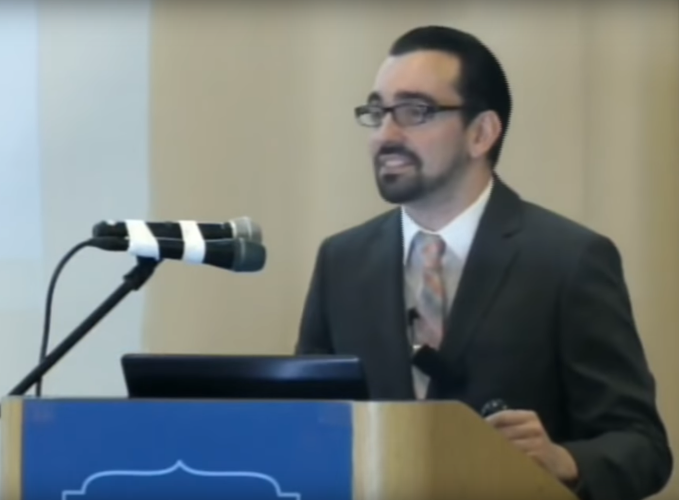

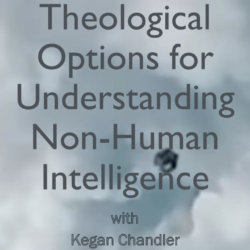
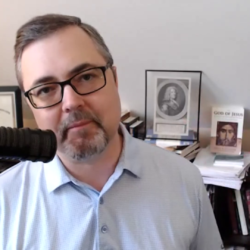
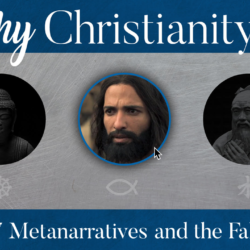

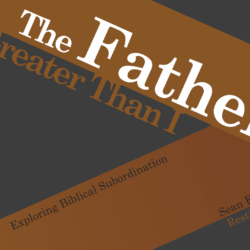
Sean,
We have learned to suspend disbelief and listen to the end of each Restitutio podcast episode, and it paid off again! What a wonderful thing to look into.
We are excited to learn more about and wrestle with this topic. It would be wonderful to be able to change our thinking in this area and, with it, realize that we really are empowered to vanquish sin.
Looking forward to the next episode!
Excellent episode! Part of the problem that a lot of people have is their definition of sin. Sin is an act, an action (whether mental or physical), that takes place at a point in time.
Sin is not a commodity that can be bought or sold.
Sin is not a feeling.
Sin is not even a temptation.
Sin is a choice that results in an act.
Sins are actions that take place in time, and cannot be transferred to a different time or a different actor.
Yes, sins can have a “payment”, or be “paid for”, but in this sense we are using the word “payment” or “paid” as a metaphor for the word “consequence”. Just as if you tell someone taking drugs, “You will pay a high price for taking drugs.” You do not mean “high price” literally, but rather metaphorically. In the same sense, “The wages of sin is death” means that the consequence of sin is death, not that someone can die to literally pay for sin.
As Chandler said, the topic is far greater than what he was able to develop in his allotted time. But I agree that it is a subject that has vast implications and needs to be attended to seriously. Jesus came so we could be freed from sinning, and thus be able to stop offending God and then be reconciled. He did not come to literally pay God so we could sin without guilt or consequences!
In Matthew 1:21 the angel told Joseph to take Mary because, “She will bear a Son; and you shall call His name Jesus, for He will save His people FROM their sins.”
This is probably one of the most important breakthroughs in modern theology. Thanks, Sean, for sharing this talk. Looking forward to hearing the response of others. I believe that it not only affects Christian life and behavior, but our Christology as well
My “breakthrough” moment was finding the answer to the question sometimes posed by our opponents:
If Jesus is not God, how did he keep himself sinless?
Because he chose to obey God, as simple as this sounds!
Like Abram and Moses before him, they believed God, i.e., held on to faith! See Hebrews 11:24-25.
I love the description of the servant of Yahweh in Isaiah 50.7:
“I have set my face like flint because I know I will not be put to shame.”
cp. Job 22.21-24f.
https://www.youtube.com/watch?v=5ipfO4TkGlw
I see a weakness in Kegan’s biblical condition. He uses verses that are addressed to believers about living in Christ and acts as if those verses are addressed to the subject of original sin. A persons state after conversion is transformed. The verses that he primarily cites at the end of the presentation are written to a new creature, not about their prior state.
Due to this misapplication of verses, he (Kegan) then forms non sequitors -suggesting or leading towards, we as believers can live perfect (without sin) lives. He that says he has no sin is a liar. That last comment was made by the Apostle John to believers.
“He that says he has no sin” is in no way the same statement as “He that says he has stopped sinning”.
What an excellent study! Until a few years ago, I was a trinatarian. Once the domino of the deity of Christ Jesus fell , then others started to fall as well. As a trinitarian, I was taught that the sin nature was passed through the father. Therefore, Jesus Christ had no human father so that he could be sinless. Now that his deity is proven wrong, he really is the same as the rest of us. Before he was a special god-man. Original sin is not taught in the Bible. Kegan Chandler’s explanation of Romans makes so much sense. It is a better understanding than the standard one that I was taught all my life.
I look forward to hearing the rest of the series.
Thank you, Kegan!